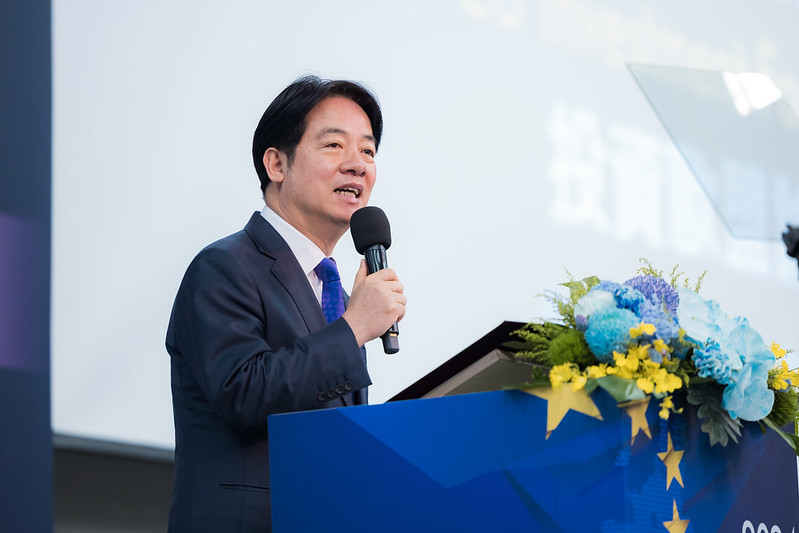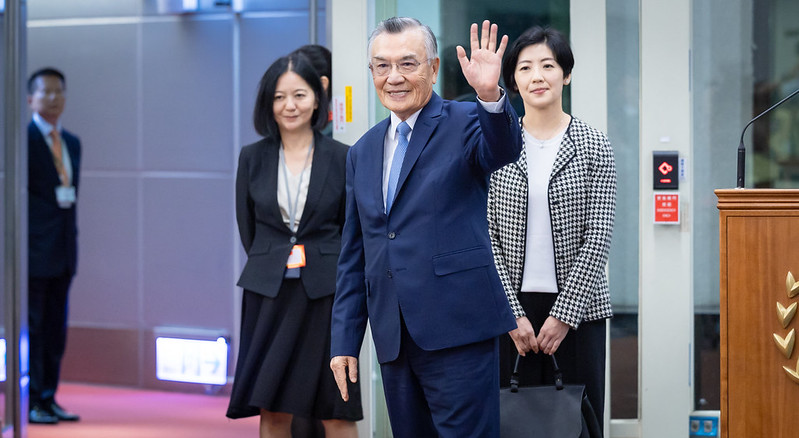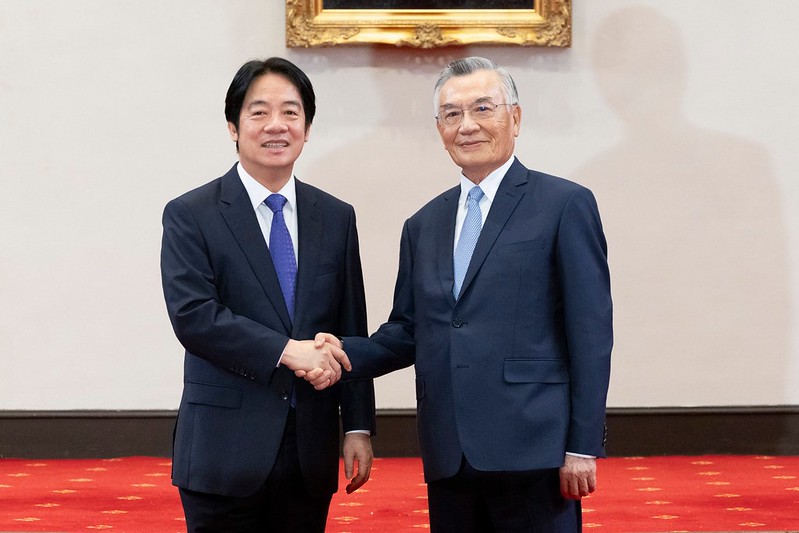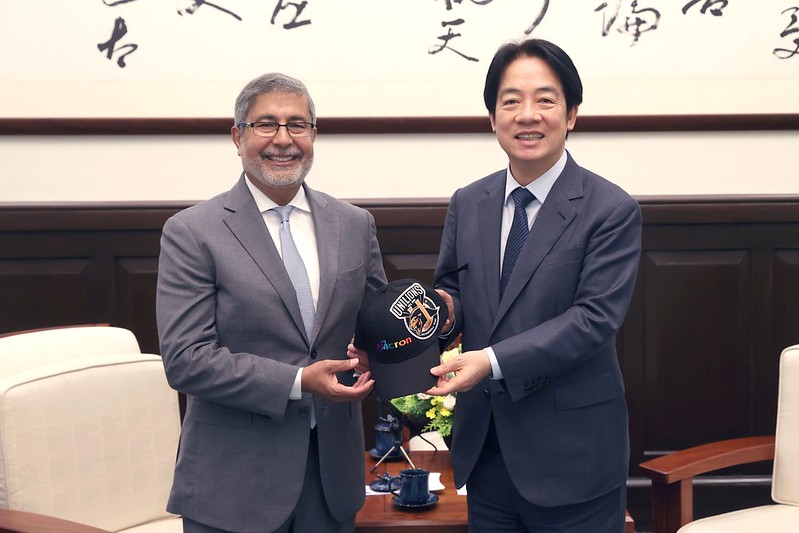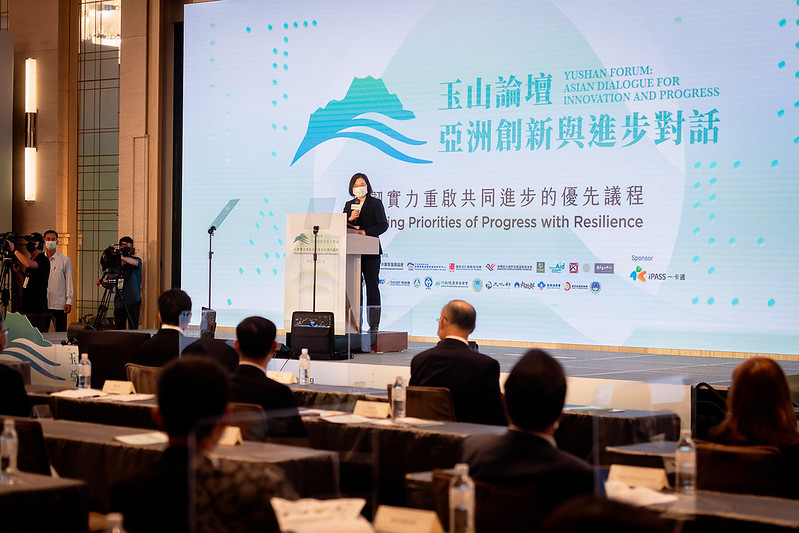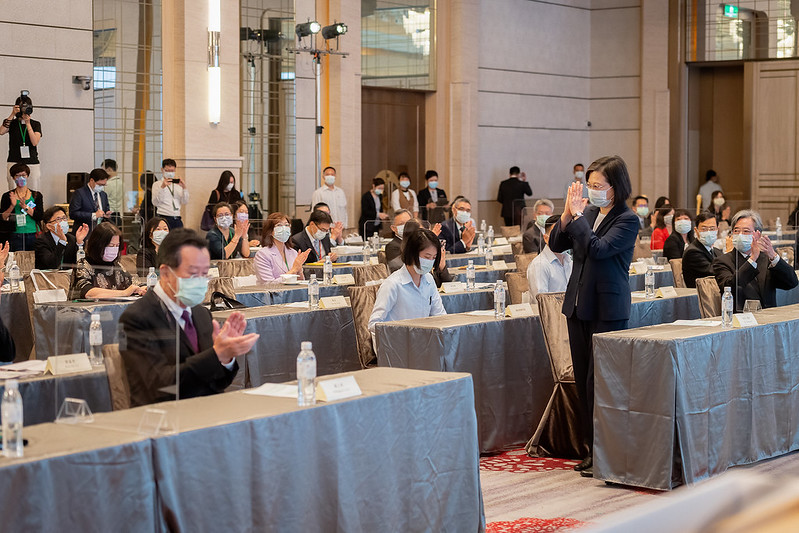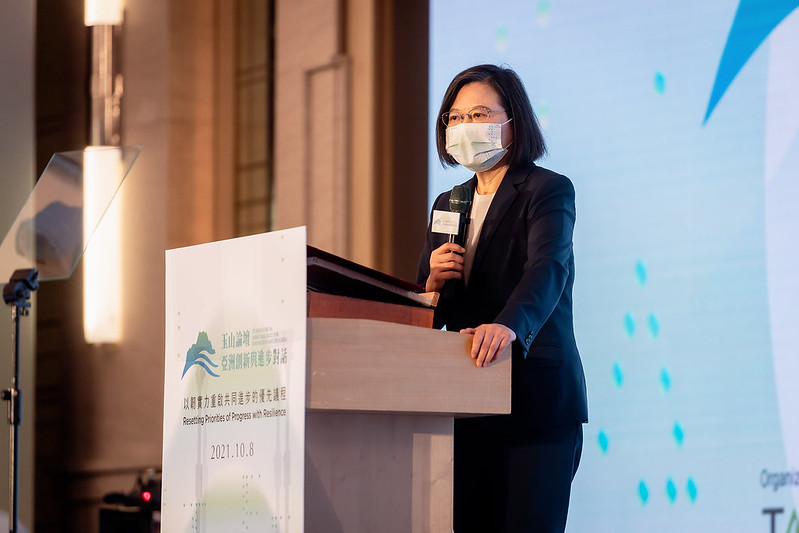News & activities
 News releases
News releases
On the morning of October 8, President Tsai Ing-wen addressed the opening of the 2021 Yushan Forum: Asian Dialogue for Innovation and Progress. In her remarks, President Tsai said that, as we enter the post-pandemic era, Taiwan's New Southbound Policy is going to be key to our engagement with the rest of Asia, and that through this policy, Taiwan will strengthen ties with regional strategic partners such as the United States, Australia, India, Japan, and ASEAN member states. The president also emphasized that Taiwan has proved it can have a significant regional presence, and that it will continue to persevere in the face of external threats while remaining an indispensable part of the Indo-Pacific.
A transcript of President Tsai's remarks follows:
First, I would like to extend a very warm welcome to you all for joining us, virtually and physically, at this year's Yushan Forum. I especially want to thank and welcome Mr. Tony Abbott, Australia's former Prime Minister, for coming all the way from Australia to join us this year. As countries around the world are still fighting the COVID-19 pandemic, we appreciate your effort to come to Taiwan to share your views on recent global developments in person.
Under the current ever-changing international environment, you and your country's consistent efforts to defend democracy, its values, and the rules-based international order while resisting coercion from authoritarian countries, are truly courageous and admirable.
I know many international leaders are joining us virtually today due to restrictions on international travel. Your participation today signifies your staunch belief in democratic values such as freedom, the rule of law, human rights, and free trade, as well as your friendship and support for Taiwan. I want to take this opportunity to invite you all to Taiwan after the pandemic recedes.
Even though our efforts to combat the pandemic remain, there are issues important to the region and the world, which require our attention and joint efforts. Issues such as "how to promote cooperation in the new reality we are facing" and "how should we reset our priorities and reinforce resilience." This year's Yushan Forum is set to facilitate discussions on these important and pressing questions, as we move towards a post-pandemic future.
During a previous Yushan Forum, Chairman [Hsin-Huang Michael] Hsiao (蕭新煌) made a keen observation: "Taiwan is not a problem but rather a solution." Taiwan, through its evolution as an economic powerhouse and a vibrant democracy, is indeed part of the solution to emerging challenges with ramifications on a global scale, from climate change and new diseases, proliferation and terrorism, to human trafficking and threats to supply chains.
Despite being excluded from international organizations, Taiwan has striven to adhere to international protocols. Taiwan has also been working proactively and diligently with like-minded partners on the development of the region.
In 2016, we launched the New Southbound Policy with the aim to facilitate regional prosperity through trade and investment partnerships, educational and people-to-people exchanges, and technological and medical cooperation with countries in South and Southeast Asia, as well as Australia and New Zealand. Since then, Taiwan has signed more than 80 agreements and MOUs with partner countries.
In 2020, as a response to the pandemic, Taiwan convened a number of virtual industrial supply chain meetings and facilitated exchanges among enterprises across ASEAN. This has led to the signing of 16 industrial cooperation agreements in areas such as electronics manufacturing, green technology, biotechnology, information services, smart cities, textiles, and pandemic prevention.
Taiwan is also making investments in our New Southbound Policy partner countries through the business community, simultaneously fostering secure supply chains and regional development. With our high-tech capabilities and a professional, globalized workforce, Taiwan is well positioned to help create secure global supply chains in sectors such as semiconductors, biotechnology, and renewable energy. In other words, in areas where international cooperation is needed now more than ever.
Moreover, Taiwan derives additional soft power from our expertise and capabilities in fields such as education, public health, and natural disaster prevention. These are fields in which our experts and institutions are taking on a growing regional role.
Our universities, for example, are prepared to work with other universities in the region to develop Chinese-language training. Our medical facilities are sharing expertise in medical technology and management with partners around Asia.
Economically, despite the flare-up of infection in the spring, Taiwan's overall economic growth reached 8.34 percent in the first half of 2021. Taiwan's exports grew 31 percent – the most among the Four Asian Tigers. Imports also increased by 28.6 percent.
Moreover, Taiwanese investment in New Southbound Policy countries over the first half of this year increased by 58.87 percent year-on-year. Reciprocally, there was an increase in New Southbound Policy countries' investment in Taiwan by 57.5 percent. Taiwan's investment in ASEAN constitutes 35.1 percent of the overall investment, exceeding the 25.8 percent investment in China.
At this critical juncture, as the world fights to regain its footing from the effects of the pandemic, Taiwan can be a crucial actor in the peaceful development and prosperity of our region.
Of course, prosperity requires a peaceful, stable, transparent and open environment. The Indo-Pacific region is now the world's fastest-growing region. What happens in the region will ultimately shape the course of the twenty-first century.
This emergence offers innumerable opportunities in everything from trade and manufacturing to research and education. But, this also brings new tensions and systemic contradictions that could have devastating effects on international security and the global economy, if they are not handled carefully. In addition to economic partnerships and people-to-people exchanges, Taiwan is fully committed to working with other regional actors to ensure stability.
For example, this March, Taiwan established a coast guard working group with the United States. This working group will improve communication and information sharing between the US and Taiwanese coast guards. It will also facilitate greater collaboration on shared objectives like preserving maritime resources and reducing illegal, unreported, and unregulated fishing. This working group, for example, would serve as a springboard for greater collaboration on non-military matters with other partners in the Indo-Pacific.
Taiwan's efforts to contribute to regional stability and security do not end there. Taiwan is fully committed to collaborating with regional players to prevent armed conflict in the East and South China Seas, and in the Taiwan Strait. Taiwan does not seek military confrontation. It hopes for a peaceful, stable, predictable, and mutually beneficial coexistence with its neighbors. But, Taiwan will also do whatever it takes to defend its freedom and democratic way of life.
As we move toward the post-pandemic era, the New Southbound Policy will be Taiwan's pivotal regional policy for Asia. Through the New Southbound Policy, Taiwan seeks to strengthen links with regional strategic partners such as the United States, Australia, India, Japan, and ASEAN countries.
We are also grateful to like-minded countries for utilizing international mechanisms such as the Japan-US Summit, the G7 Leaders' Summit, the US-EU Summit and the Australia-France and Australia-Japan 2+2 ministerial consultations to emphasize the importance of peace and stability in the region and across the Taiwan Strait.
Taiwan may be small in terms of territory, but it has proved that it can have a large regional presence. Taiwan has persevered in the face of existential threats and made itself an indispensable actor in the Indo-Pacific.
Going forward, our high-tech industries, and especially our production of advanced semiconductors, will help to fuel the regional and global economies.
Despite the challenges posed by the pandemic, the last two years were also exemplified by warmth, resilience, friendship, and partnership. As Taiwan donated material and provided assistance to the world at the onset of the pandemic, the world also came to Taiwan's aid with life-saving vaccines.
Time and again, we all were confronted by great challenges. But we have always been able to triumph by working together. United, we will prevail.
Lastly, I want to wish you all a successful forum. I want to welcome former Prime Minister Abbott to Taiwan again. I enjoyed our conversation yesterday and I hope you enjoy the rest of your stay in Taiwan.
Thank you, Chairman Hsiao, for the invitation to speak at this important event.
Among those who participated in the forum were National Security Council Secretary-General Wellington Koo (顧立雄), Minister of Foreign Affairs Joseph Wu (吳釗燮), former Australian Prime Minister Tony Abbott, Taiwan-Asia Exchange Foundation Chairman Hsin-Huang Michael Hsiao, and Executive Director Alan H. Yang (楊昊). Former Japanese Prime Minister Shinzo Abe's greetings were read out at the event, and Member of Japan's House of Representatives Keiji Furuya (chairman of the Japan-ROC Diet Members' Consultative Council), who was attending the event online, delivered remarks.

